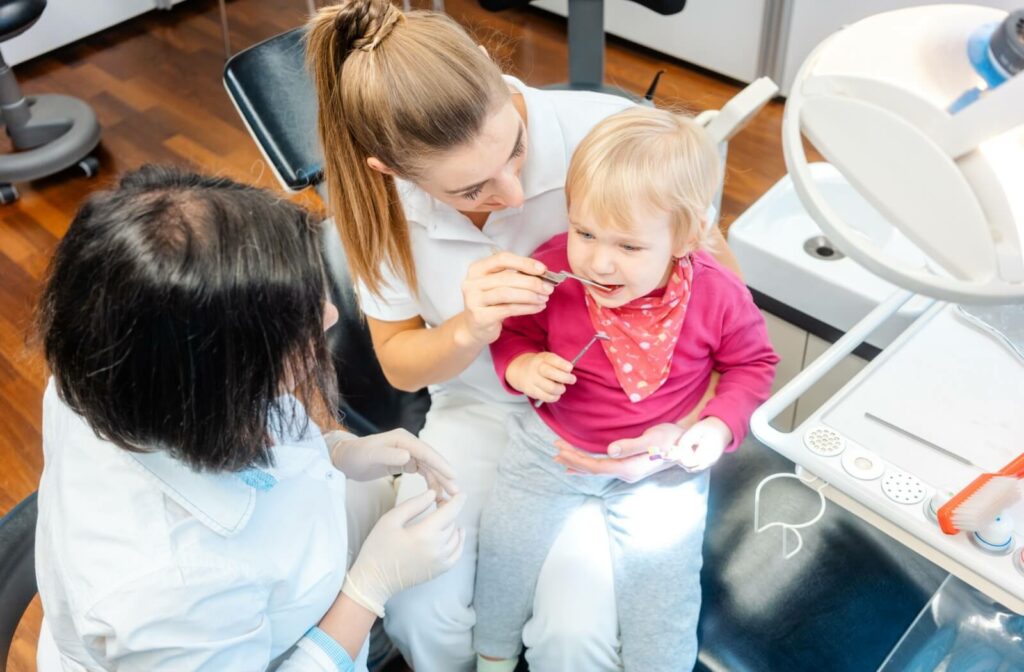Breath is a sign of life. It’s one of the most instinctive acts a baby performs, from the moment they are born. Most infants breathe through their noses (the ideal and preferred breathing method for all of us), delivering oxygen to their tiny bodies.
Infants can start mouth breathing at around the 3–6 month mark as their airways and breathing patterns mature.
Babies are people! They can have allergies, colds, or other acute conditions that block their nasal passages, forcing them to mouth breath. That’s completely normal! However, chronic mouth breathing can adversely affect their overall health and development.
We strongly recommend visiting a pediatric dentist the moment you notice signs of chronic mouth breathing in your baby. Timely intervention through airway dentistry can support your child’s overall health and development.
Encouraging healthy habits early, such as proper breathing, sets a predicant for a child’s future.
Baby’s First Breath (Through Their Mouth)
We consider newborns “obligate nose breathers,” meaning that their anatomy allows them to breathe almost exclusively through their noses during the first few months of life. Nasal breathing means that babies can feed and breathe simultaneously! Breath and nourishment are critical for their survival, growth, and healthy development.
However, babies grow and develop. As the months go on and their airways and breathing patterns start to mature, they may breathe through their mouths in certain cases.
Since mouth breathing isn’t our default setting, babies turn to this option temporarily due to underlying factors such as:
- Nasal congestion: Cold, allergies, or other factors can block nasal airways.
- Enlarged tonsils or adenoids: These can partially block the nasal airway, encouraging mouth breathing.
- Structural issues: Conditions like a deviated septum or cleft palate may affect normal nasal breathing.
- Sleep Patterns: During the early stages of sleep training or irregular sleeping positions, mouth breathing may occur.
Don’t panic! If your baby occasionally breathes with their mouth, this is normal and usually harmless. It only becomes concerning when infants only mouth breathe, signaling an underlying issue that requires further investigation.
Breathing: Nose vs Mouth
Nasal breathing is the preferred option for humans, especially infants.
The nose acts as an air filter, humidifying and warming the air and trapping particles, which can help reduce illness and maximize efficient oxygen delivery to the body. Although some people find mouth-breathing more comfortable and convenient, it bypasses these protective mechanisms.
Babies might occasionally breathe through their mouths because of temporary factors, and that’s okay! However, when babies do this constantly, it’s something to be mindful of because it can negatively affect their overall health and development.
Constant mouth breathing can lead to:
- Reduced oxygen intake because nasal breathing is more efficient for oxygen exchange.
- Dry mouth, which increases the risk of oral health issues such as cavities and gum inflammation.
- Altered facial development, including narrow jaw growth or misaligned teeth.
- Sleep disturbances that can affect growth, immunity, and cognitive development.
- Low self-esteem, as well as difficulty with speech development and proper teeth alignment.

Therefore, we encourage you to observe your baby’s breathing patterns. Certain signs that suggest your baby is chronically mouth breathing include:
- Consistently sleeping with their mouth open.
- Frequent dry mouth or chapped lips.
- Snoring or noisy breathing during sleep.
- Noticeable difficulty breathing through the nose, even when they appear calm.
Early detection and timely intervention can prevent worsening health. If you notice these signs, visiting a pediatric dentist can help identify underlying health or developmental concerns.
Promoting Healthy Breathing with Airway Dentistry
Airway dentistry is a specialized field focusing on conditions related to airway health, proper breathing, and facial development. Pediatric airway dentists work to identify issues affecting your baby’s breathing.
The earlier you seek professional health, the better you can support your child’s health and development. Intervening early allows for:
- A proactive approach to identifying the root cause of habitual mouth breathing.
- Preventative measures to avoid complications in facial and oral development.
- Tailored solutions to promote healthy breathing patterns.
We recommend scheduling your baby’s first dental visit by their first birthday, or as soon as you notice concerning signs of habitual mouth breathing.
Fortunately, in most cases, we can correct mouth breathing in babies with proper intervention. Depending on the root cause, your pediatric dentist may recommend:
- Treating nasal congestion with appropriate medications or techniques.
- Minor procedures, such as removing enlarged adenoids or tonsils.
- Myofunctional therapy is a treatment that uses exercises to improve breathing, swallowing, and tongue posture.
- Dental appliances to support proper development and address any structural barriers to nasal breathing.
It can be overwhelming to watch your baby struggle with mouth breathing. However, these treatment options are safe, effective, and most importantly, help your child breathe easier.
Supporting Your Baby’s Health
Breath is a sign of life. Monitoring your baby’s breathing habits is one way to confirm that their growth, development, and overall health are progressing on the right track. Disruptions in their breathing pattern (like constant mouth breathing) can indicate an underlying concern requiring prompt intervention.
Don’t wait to seek answers. Set your baby up for a healthier future.
At Bloom Orthodontics, we’re here to support you and your baby every step of the way. Book a consultation with one of our pediatric dentists today to discuss your concerns and explore tailored solutions to promote your child’s healthy breathing habits.



